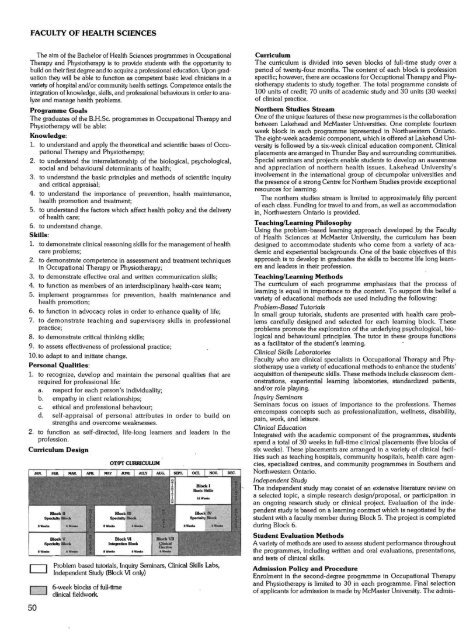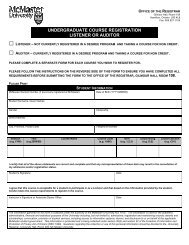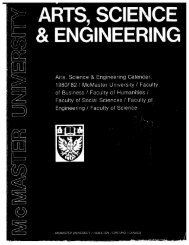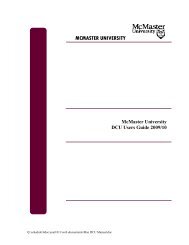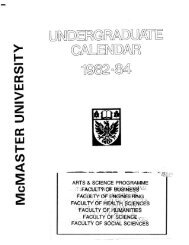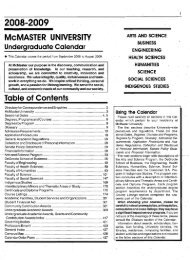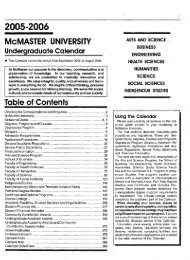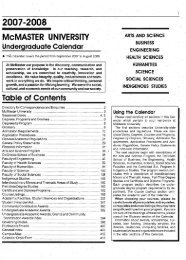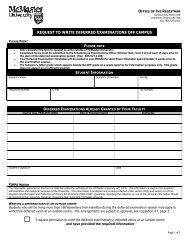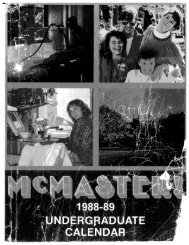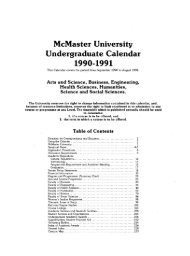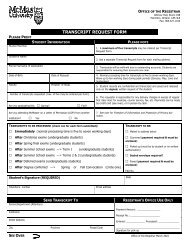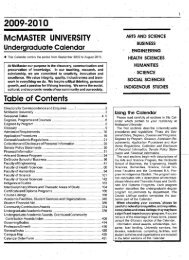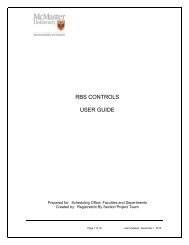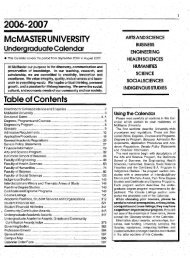1991/1992 - Office of the Registrar - McMaster University
1991/1992 - Office of the Registrar - McMaster University
1991/1992 - Office of the Registrar - McMaster University
Create successful ePaper yourself
Turn your PDF publications into a flip-book with our unique Google optimized e-Paper software.
FACULTY OF HEALTH SCIENCES<br />
The aim <strong>of</strong> <strong>the</strong> Bachelor <strong>of</strong> Health Sciences programmes in Occupational<br />
Therapy and Physio<strong>the</strong>rapy is to provide students with <strong>the</strong> opportunity to<br />
build on <strong>the</strong>ir first degree and to acquire a pr<strong>of</strong>essional education. Upon graduation<br />
<strong>the</strong>y will be able to function as competent basic level clinicians in a<br />
variety <strong>of</strong> hospital and/or community health settings. Competence entails <strong>the</strong><br />
integration <strong>of</strong> knowledge, skills, and pr<strong>of</strong>essional behaviours in order to analyze<br />
and manage health problems.<br />
Programme Goals<br />
The graduates <strong>of</strong> <strong>the</strong> B.H.Sc. programmes in Occupational Therapy and<br />
Physio<strong>the</strong>rapy will be able:<br />
Knowledge:<br />
1. to understand and apply <strong>the</strong> <strong>the</strong>oretical and scientific bases <strong>of</strong> Occupational<br />
Therapy and Physio<strong>the</strong>rapy;<br />
2. to understand <strong>the</strong> interrelationship <strong>of</strong> <strong>the</strong> biological, psychological,<br />
social and behavioural determinants <strong>of</strong> health;<br />
3. to understand <strong>the</strong> basic principles and methods <strong>of</strong> scientific inquiry<br />
and critical appraisal;<br />
4. to understand <strong>the</strong> importance <strong>of</strong> prevention, health maintenance,<br />
health promotion and treatment;<br />
5. to understand <strong>the</strong> factors which affect health policy and <strong>the</strong> delivery<br />
<strong>of</strong> health care;<br />
6. to understand change.<br />
Skills:<br />
1. to demonstrate clinical reasoning skills for <strong>the</strong> management <strong>of</strong> health<br />
care problems;<br />
2. to demonstrate competence in assessment and treatment techniques<br />
in Occupational Therapy or Physio<strong>the</strong>rapy;<br />
3. to demonstrate effective oral and written communication skills;<br />
4. to function as members <strong>of</strong> an interdisciplinary health-care team;<br />
5. implement programmes for prevention, health maintenance and<br />
health promotion;<br />
6. to function in advocacy roles in order to ·enhance quality <strong>of</strong> life;<br />
7. to demonstrate teaching and supervisqry skills in pr<strong>of</strong>essional<br />
practice;<br />
8. to demonstrate critical thinking skills;<br />
9. to assess effectiveness <strong>of</strong> pr<strong>of</strong>essional practice;<br />
10. to adapt to and initiate change.<br />
Personal Qualities:<br />
1. to recognize, develop and maintain <strong>the</strong> personal qualities that are<br />
required for pr<strong>of</strong>essional life:<br />
a. respect for each person's individuality;<br />
b. empathy in client relationships;<br />
c. ethical and pr<strong>of</strong>essional behaviour;<br />
d. self-appraisal <strong>of</strong> personal attributes in order to builc;l on<br />
strengths and overcome weaknesses.<br />
2. to function as self-directed, life-long learners and leaders in <strong>the</strong><br />
pr<strong>of</strong>ession.<br />
Curriculum Design<br />
D<br />
D<br />
so<br />
OTIPT CURRICULUM<br />
Problem based tutorials, Inquiry Seminars, Clinical SkiIls Labs,<br />
Independent Study (Block VI only)<br />
6-week blocks <strong>of</strong> full-time<br />
clinical fieldwork.<br />
Curriculum<br />
The curriculum is divided into seven blocks <strong>of</strong> full-time study over a<br />
period <strong>of</strong> twenty-four months. The content <strong>of</strong> each block is pr<strong>of</strong>ession<br />
specific; however, <strong>the</strong>re are occasions for Occuptional Therapy and Physio<strong>the</strong>rapy<br />
students to study toge<strong>the</strong>r. The total programme consists <strong>of</strong><br />
100 units <strong>of</strong> credit; 70 units <strong>of</strong> academic study and 30 units (30 weeks)<br />
<strong>of</strong> clinical practice.<br />
Nor<strong>the</strong>rn Studies Stream<br />
One <strong>of</strong> <strong>the</strong> unique features <strong>of</strong> <strong>the</strong>se new programmes is <strong>the</strong> collaboration<br />
between Lakehead and <strong>McMaster</strong> Universities. One complete fourteen<br />
week block in each programme ispresented in Northwestern Ontario.<br />
The eight-week academic component, which is <strong>of</strong>fered at Lakehead <strong>University</strong><br />
is followed by a six-week clinical education component. Clinical<br />
placements are arranged in Thunder Bay and surrounding communities.<br />
Special seminars and projects enable students to develop an awareness<br />
and appreciation <strong>of</strong> nor<strong>the</strong>rn health issues. Lakehead <strong>University</strong>'s<br />
involvement in <strong>the</strong> international group <strong>of</strong> circumpolar universities and<br />
<strong>the</strong> presence <strong>of</strong> a strong Centre for Nor<strong>the</strong>rn Studies provide exceptional<br />
resources for learning.<br />
The nor<strong>the</strong>rn studies stream is limited to approximately fifty percent<br />
<strong>of</strong> each c\~ss. Funding for travel to and from, as well as accommodation<br />
in, Northwestern Ontario is provided.<br />
Teaching/Learning Philosophy<br />
Using <strong>the</strong> problem-based learning approach developed .by <strong>the</strong> Faculty<br />
<strong>of</strong> Health Sciences at <strong>McMaster</strong> <strong>University</strong>, <strong>the</strong> curriculum has been<br />
designed to accommodate students who come from a variety <strong>of</strong> academic<br />
and experiential backgrounds. One <strong>of</strong> <strong>the</strong> basic objectives <strong>of</strong> this<br />
approach is to develop in graduates <strong>the</strong> skills to become life long learners<br />
and leaders in <strong>the</strong>ir pr<strong>of</strong>ession.<br />
Teaching/Learning Methods<br />
The curriculum <strong>of</strong> each programme emphasizes that <strong>the</strong> process <strong>of</strong><br />
learning is equal in importance to <strong>the</strong> content. To support this belief a<br />
variety <strong>of</strong> educational methods are used including <strong>the</strong> following:<br />
Problem-Based Tutorials<br />
In small group tutOrials, students are presented with health care problems<br />
carefully designed and selected for each learning block. These<br />
problems promote <strong>the</strong> exploration <strong>of</strong> <strong>the</strong> underlying psychological, biological<br />
and behavioural principles. The tutor in <strong>the</strong>se groups functions<br />
as a facilitator <strong>of</strong> <strong>the</strong> student's learning.<br />
Clinical Skills Laboratories<br />
Faculty who are clinical specialists in Occupational Therapy and Physio<strong>the</strong>rapy<br />
use a variety <strong>of</strong> educational methods to enhance <strong>the</strong> students'<br />
acquisition <strong>of</strong> <strong>the</strong>rapeutic skills. These methods include classroom demonstrations,<br />
experiential learning laboratories, standardized patients,<br />
and/or role piaying.<br />
Inquiry Seminars<br />
Seminars focus on issues <strong>of</strong> importance to <strong>the</strong> pr<strong>of</strong>essions. Themes<br />
emcompass concepts such as pr<strong>of</strong>essionalization, wellness, disability,<br />
pain, work, and leisure.<br />
Clinical Education<br />
Integrated with <strong>the</strong> academic component <strong>of</strong> <strong>the</strong> programmes, students<br />
spend a total <strong>of</strong> 30 weeks in full-time clinical placements (five blocks <strong>of</strong><br />
six weeks). These placements are arranged in a variety <strong>of</strong> clinical facilities<br />
such as teaching hospitals, commun'ity hospitals, health care agencies,<br />
speCialized centres, and community programmes in Sou<strong>the</strong>rn and<br />
Northwestern Ontario.<br />
Independent Study<br />
The independent study may consist <strong>of</strong> an extensive literature review on<br />
a selected topic, a simple research design/proposal, or participation in<br />
an ongoing research study or clinical project. Evaluation <strong>of</strong> <strong>the</strong> independent<br />
study is based on a learning contract which is negotiated by <strong>the</strong><br />
student with a faculty member during Block 5. The project is completed<br />
during Block 6.<br />
Student Evaluation Methods<br />
A variety <strong>of</strong> methods are used to assess student performance throughout<br />
<strong>the</strong> programmes, including written and oral evaluations, presentations,<br />
and tests <strong>of</strong> clinical skills.<br />
Admission Policy and Procedure<br />
Enrolment in <strong>the</strong> second-degree programme in Occupational Therapy<br />
and Physio<strong>the</strong>rapy is limited to 30 in each programme. Final selection<br />
<strong>of</strong> applicants for admission is made by <strong>McMaster</strong> <strong>University</strong>. The admis-


